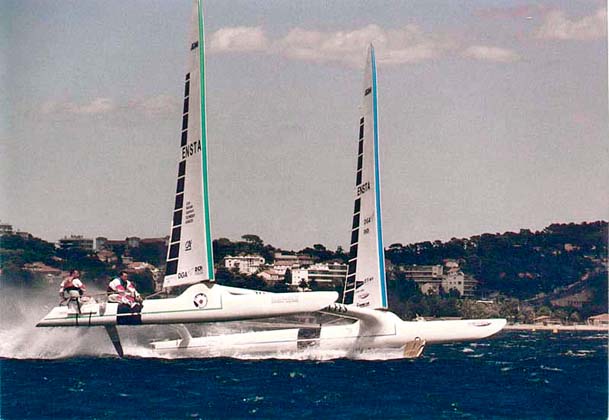Foiling has taken the watersports world by storm in recent years, but the history of the hydrofoiler goes back further than you might think
The biggest revolution to hit watersports in general has been foiling, and it’s easy to view the use of hydrofoils as a relatively recent phenomenon.
In truth, although foiling has really taken off (if you’ll forgive the pun) in recent years in everything from surfing to sailing, paddleboarding, and beyond, the history of the hydrofoil goes back far further than many might assume.
The world of powered foilers kicked things off early but even sail-powered foiling craft are much older than you may realise.
The history of foiling
The early development of hydrofoils started over 100 years ago when Italian Enrico Forlanini achieved 36.9 knots with his 60hp airscrew-driven boat in 1906. Several engineers took notice, among them the Wright Brothers and Alexander Graham Bell, both of whom experimented with foilborne craft.
Within a few years speeds moved briskly into the 50-knot range for power boats, but it wasn’t until 1938 that a sailing boat got up onto foils with Americans Gilruth and Carl who managed to foil at five knots. Here are some key moments:
1869 – First patent for hydrofoil was for a rowing boat, French application made by Emmanuel Denis Fargot.
1906 – First hydrofoil boat designed and built by Enrico Forlanini. It had a ladder-type construction with multiple struts supporting multiple wings. It achieved 36.9 knots.
1918 – Alexander Graham Bell and Casey Baldwin launched their HD-4, a five-tonne vessel powered by two liberty aircraft engines of 350hp each and reached 52 knots. The HD-4 Hydrodrome later set a new world record of 61.58 knots.
1938 – First known sailing hydrofoil was produced by Americans R. Gilruth and Bill Carl.
1955 – Monitor clocked at 25 knots. She was designed by Gordon Baker and built by the Baker Manufacturing Company of Evansville, Wisconsin. The US Navy shared part of the cost of construction.
In October 1956 she was recorded at 30.4 knots and was later said to have sailed close to 40 knots.
1970 – The first hydrofoil cruiser. David Keiper’s Williwaw cruised throughout the South Pacific clocking up 20,000 miles.
1974 – Mayfly foiling cat established world record for A Class in Weymouth at 19.38 knots. In 1977 she set the bar higher at 23 knots.
1976 – Icarus, a modified foiling Tornado (above), set a new world record in B class at 20.70 knots. By 1985 Grogono and Fowler had raised their speed to 28.14 knots.
1980 – Eric Tabarly beat the schooner Atlantic’s transatlantic record by more than two days in offshore foiler Paul-Ricard.
1990 – Hobie Trifoiler, a twin-sail trimaran with a mainsail on each outrigger, capable of 30 knots, making it the fastest production sailboat in the world. The prototype, Longshot, was developed by Dan and Greg Ketterman with Russell Long.
1992 – Russell Long broke his own world records for the fourth time in the Trifoiler clocking 43.55 knots.
1994 – Alain Thébault’s L’Hydroptère foiling tri launched.
1997 – Techniques Avancées, a French foilborne proa, set a new world speed record in the D class, at 42.12 knots
2005 – Rohan Veal wins the International Moth World Championship sailing a Moth class dinghy with hydrofoils fitted.

L’Hydroptère, former speed record holder. Photo: Christophe Launay
2009 – L’Hydroptère set new outright world speed record over 500m 51.36knots.

SailRocket2 clocked an unprecedented 64.45 knots
2012 – Sailrocket II broke L’Hydroptère’s record to set new outright world record over 500m of 65.45knots.
2013 – The America’s Cup goes foiling as Oracle Team USA beat Emirates Team New Zealand both sailing foiling 72ft catamarans, the AC72s.

The G4 foiling catamaran
2015 – Gunboat launch the Gunboat G4, a foiling high performance cruising catamaran

IMOCA 60 Banque Populaire VIII, sailed by Armel Le Cléac’h wins the 2016/2017 Vendee Globe on a semi-foiling design
2016 – The Vendée Globe sees semi-foiling IMOCA 60 keelboats on the startline for the first time.
2017 – Emirates Team New Zealand win the America’s Cup in a foiling AC50 catamaran

Emirates Team New Zealand racing in the 2021 America’s Cup in Auckland, New Zealand. Photo: ACE / Studio Borlenghi
2021 – Emirates Team New Zealand defend the 2021 America’s Cup in a brand new foiling monohull, the AC75
 If you enjoyed this….
If you enjoyed this….
Yachting World is the world’s leading magazine for bluewater cruisers and offshore sailors. Every month we have inspirational adventures and practical features to help you realise your sailing dreams.Build your knowledge with a subscription delivered to your door. See our latest offers and save at least 30% off the cover price.












